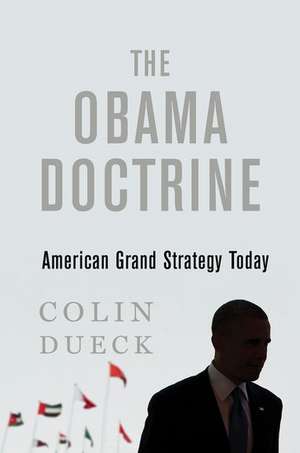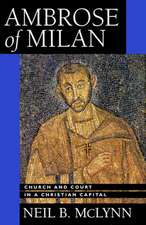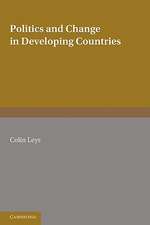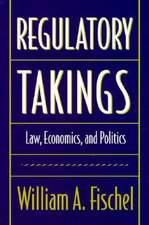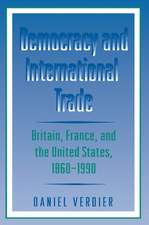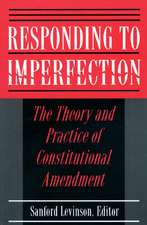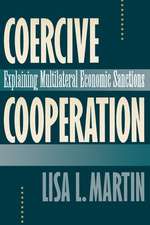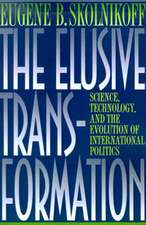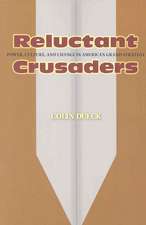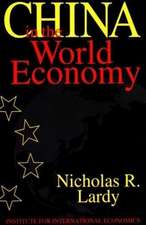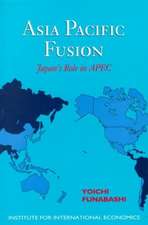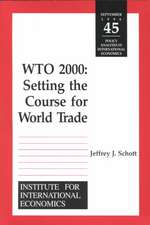The Obama Doctrine: American Grand Strategy Today
Autor Colin Duecken Limba Engleză Paperback – 13 sep 2017
| Toate formatele și edițiile | Preț | Express |
|---|---|---|
| Paperback (1) | 85.75 lei 10-16 zile | |
| Oxford University Press – 13 sep 2017 | 85.75 lei 10-16 zile | |
| Hardback (1) | 99.53 lei 10-16 zile | |
| Oxford University Press – 8 iul 2015 | 99.53 lei 10-16 zile |
Preț: 85.75 lei
Preț vechi: 95.79 lei
-10% Nou
Puncte Express: 129
Preț estimativ în valută:
16.41€ • 17.83$ • 13.80£
16.41€ • 17.83$ • 13.80£
Carte disponibilă
Livrare economică 20-26 martie
Preluare comenzi: 021 569.72.76
Specificații
ISBN-13: 9780190659943
ISBN-10: 0190659947
Pagini: 336
Dimensiuni: 206 x 137 x 20 mm
Greutate: 0.38 kg
Editura: Oxford University Press
Colecția OUP USA
Locul publicării:New York, United States
ISBN-10: 0190659947
Pagini: 336
Dimensiuni: 206 x 137 x 20 mm
Greutate: 0.38 kg
Editura: Oxford University Press
Colecția OUP USA
Locul publicării:New York, United States
Recenzii
May be a useful study for Republican candidates in the 2016 campaigns, as [it] outlines how grand strategy should be directed and where we need to go to save America's place as a top world power... [Dueck's] ideas are clear, his arguments sound and his policy proposals professional. A good book for those who think the current policy just isn't doing its job.
Dueck examines the Obama Doctrine's shortcomings as a strategic outlook and Obama's mistakes in implementing it, the domestic politics of foreign affairs, and several conservative alternatives. Finally, he defends what he calls conservative American realism. With this multifaceted book, he takes his place among our premier scholars of foreign affairs.
Colin Dueck takes a sober and analytical approach... In all these moves, writes Dueck, Obama has shown a much keener political sensibility than is commonly appreciated... The apparent success of the Obama doctrine lasted just long enough to see him through reelection. Not long after, the chickens started coming home to roost... Dueck's case-by-case narrative of these failures makes for harrowing reading. Dueck tries his academic best to give Obama a fair assessment, noting that Obama is highly intelligent and analytical... Dueck is particularly helpful in connecting the dots between America's foreign policy and its domestic politics.
Obama's real priority has been his domestic agenda. At best, foreign policy has been a distraction, in Dueck's view. At worst, Obama's record has been a tale of drift, ambivalence, and well-intentioned naivete. It has also been marred by inexperience... There is a lot to support Dueck's take.
With so many Democrats opposing his signature initiative, a lot of liberals are joining conservatives in moving on
I predict presidential candidates for 2016 will mine this book for its clarion call for strategic change... Dueck offers an incisive depiction of the Republican Party and its various foreign policy and defense camps... The Obama Doctrine offers a strategy that integrates diplomacy, allies, forward presence, trade, and military power... Smartly executed and well worth reading.
In The Obama Doctrine, Colin Dueck describes Barack Obama's foreign policy as one of accommodating America's adversaries in the belief that genuine and overarching cooperation is possible. Dueck, a historian of American foreign policy's grand strategies over the years, recommends instead what he calls a conservative American realism, to preserve America's security and influence. It's a useful contribution as Americans face the task of electing a new president.
Dueck's powerful analysis contrasts the Obama Administration's policy of strategic incoherence, which subordinates international commitments to domestic priorities, with the ongoing dominance of internationalists in the Republican Party. Required reading in the run-up to the 2016 presidential election.
Colin Dueck has established himself as one of our pre-eminent students of Grand Strategy. His judicious, balanced and comprehensive critique of President Obama's policy of retrenchment and accommodation will become the point of departure for all future accounts of the current Administration's strategy (or lack thereof).
The Obama Doctrine not only offers a reasoned and insightful critique of Barack Obama's approach to national security, but also charts an alternative path forward to preserve American influence in an increasingly challenging world.
This book demonstrates why Dueck is one of the leading scholars of American grand strategy, and in particular one of the foremost interpreters of President Obama's grand strategy. Dueck advances a provocative argument and defends it with careful logic and evidence. This will be a touchstone for the growing debate over Obama's foreign policy legacy.
The Obama Doctrine is a lucid, penetrating critique of President Obama's foreign policy and a compelling argument for a more confident and coherent American approach to the world. An important book.
Colin Dueck has written an immensely timely and insightful treatment of Obama foreign policy and its strategies of retrenchment and accommodation. He makes a compelling case that these policies have often weakened the U.S. position abroad and encouraged America's adversaries.
[Dueck] has written what is likely to emerge as one of the principal critiques of President Obama's record on foreign policy . . . [he] makes a clear, systematic case for posture of 'conservative American realism'".
Should be required reading for 2016 presidential candidates and their staffs.
Dueck examines the Obama Doctrine's shortcomings as a strategic outlook and Obama's mistakes in implementing it, the domestic politics of foreign affairs, and several conservative alternatives. Finally, he defends what he calls conservative American realism. With this multifaceted book, he takes his place among our premier scholars of foreign affairs.
Colin Dueck takes a sober and analytical approach... In all these moves, writes Dueck, Obama has shown a much keener political sensibility than is commonly appreciated... The apparent success of the Obama doctrine lasted just long enough to see him through reelection. Not long after, the chickens started coming home to roost... Dueck's case-by-case narrative of these failures makes for harrowing reading. Dueck tries his academic best to give Obama a fair assessment, noting that Obama is highly intelligent and analytical... Dueck is particularly helpful in connecting the dots between America's foreign policy and its domestic politics.
Obama's real priority has been his domestic agenda. At best, foreign policy has been a distraction, in Dueck's view. At worst, Obama's record has been a tale of drift, ambivalence, and well-intentioned naivete. It has also been marred by inexperience... There is a lot to support Dueck's take.
With so many Democrats opposing his signature initiative, a lot of liberals are joining conservatives in moving on
I predict presidential candidates for 2016 will mine this book for its clarion call for strategic change... Dueck offers an incisive depiction of the Republican Party and its various foreign policy and defense camps... The Obama Doctrine offers a strategy that integrates diplomacy, allies, forward presence, trade, and military power... Smartly executed and well worth reading.
In The Obama Doctrine, Colin Dueck describes Barack Obama's foreign policy as one of accommodating America's adversaries in the belief that genuine and overarching cooperation is possible. Dueck, a historian of American foreign policy's grand strategies over the years, recommends instead what he calls a conservative American realism, to preserve America's security and influence. It's a useful contribution as Americans face the task of electing a new president.
Dueck's powerful analysis contrasts the Obama Administration's policy of strategic incoherence, which subordinates international commitments to domestic priorities, with the ongoing dominance of internationalists in the Republican Party. Required reading in the run-up to the 2016 presidential election.
Colin Dueck has established himself as one of our pre-eminent students of Grand Strategy. His judicious, balanced and comprehensive critique of President Obama's policy of retrenchment and accommodation will become the point of departure for all future accounts of the current Administration's strategy (or lack thereof).
The Obama Doctrine not only offers a reasoned and insightful critique of Barack Obama's approach to national security, but also charts an alternative path forward to preserve American influence in an increasingly challenging world.
This book demonstrates why Dueck is one of the leading scholars of American grand strategy, and in particular one of the foremost interpreters of President Obama's grand strategy. Dueck advances a provocative argument and defends it with careful logic and evidence. This will be a touchstone for the growing debate over Obama's foreign policy legacy.
The Obama Doctrine is a lucid, penetrating critique of President Obama's foreign policy and a compelling argument for a more confident and coherent American approach to the world. An important book.
Colin Dueck has written an immensely timely and insightful treatment of Obama foreign policy and its strategies of retrenchment and accommodation. He makes a compelling case that these policies have often weakened the U.S. position abroad and encouraged America's adversaries.
[Dueck] has written what is likely to emerge as one of the principal critiques of President Obama's record on foreign policy . . . [he] makes a clear, systematic case for posture of 'conservative American realism'".
Should be required reading for 2016 presidential candidates and their staffs.
Notă biografică
Colin Dueck is an Associate Professor in George Mason University's School of Policy, Government, and International Affairs. He studied politics at Princeton University, and international relations at Oxford under a Rhodes scholarship. He has published two books on American foreign and national security policies, Hard Line: The Republican Party and U.S. Foreign Policy since World War II, and Reluctant Crusaders: Power, Culture, and Change in American Grand Strategy.
